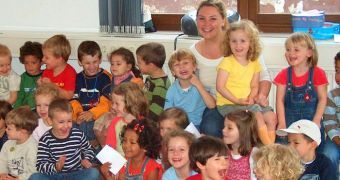Children who learn more in kindergarten are very likely to end up earning more money than their peers who study less. The conclusion belongs to a new scientific study, which shows that kids who learn a lot tend to cash in higher salaries when they become adults. Research into this correlation is only beginning.
Scientists have never investigated the correlation between early childhood test scores and earnings in too much detail. But recently some research groups have begun investigating the relationship between kids' performances in kindergarten and their financial success as adults.
One of the most interesting conclusions in the new study is that the children who fared best in early assessments tended to be more successful in life overall, when compared to their peers. The work was conducted by experts at the Harvard University, who were led by economist John Friedman.
The investigation evidenced that children whose scores progress from an average rating on the Stanford Achievement Test to one in the 60th percentile can expect significant payment boosts by the age of 27. The scientists determined that they are very likely to win about $1,000 more per year than peers whose performances remain average throughout kindergarten.
“Kindergarten interventions matter a great deal for long-term outcomes. For instance, being in a smaller class for two years increases the probability of attending college by 2 percent,” says Friedman, quoted by the US National Science Foundation (NSF).
“We find that both smaller class sizes and teachers with more experience improve long-term outcomes. We believe that other teacher characteristics, as well as various characteristics of a student's peers, also have significant impacts on later life outcomes, but the data did not allow us to measure those effects well,” he adds.
Students from the same groups and with equivalent socioeconomic statuses are also likely to exhibit varied college attendance rates, depending on their kindergarten scores. Those whose results progress constantly are a lot more likely to go on and enlist in a college.
The new investigation was sponsored by the NSF Division of Social and Economic Sciences, examined the results of nearly 12,000 adults, who were tracked since kindergarten.

 14 DAY TRIAL //
14 DAY TRIAL //